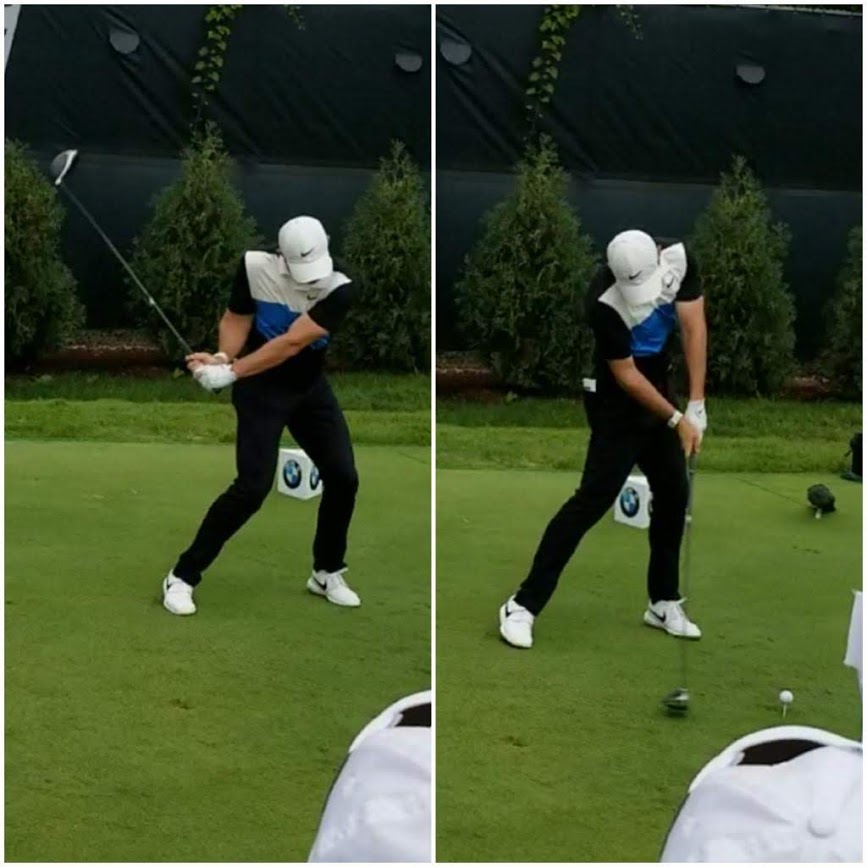How to Generate Power Like Rory McIlroy
I have a love/hate relationship with Rory McIlroy’s golf swing.
Essentially, there are two main reasons people hit a golf ball a far: clubhead speed, and quality of contact. That being said, there are two ways to generate the clubhead speed:
The arc of your swing, and/or…
Having your body work as one well oiled machine.
Occasionally (read: constantly), it drives me crazy to watch Rory hit tee shot after tee shot that FLIES 320 yards.
Not because I dislike Rory; I actually really like the guy. It just seems so unfair that THAT distance can come from a man of his stature. I know the guy is in fantastic shape, and I know he’s a strong guy. But doesn’t it just seem impossible that a guy who’s listed at 5’9” can carry the ball 320? You’ve probably thought this before yourself.
I’m between 6’0” and 6’4” (depending on which convenient store I’m leaving), about 200 lbs, a single digit handicap despite what Adam Fonseca and Matt Hackett will tell you, (Editor’s note: on the PLUS side), I played college golf, have given hundreds of lessons and can hit it what I consider to be far. My ball speed is anywhere from 167-171, and I fly it in the 270-280 range, and rolls out to roughly 300, depending on the conditions. I consider that perfectly fine.
But how the hell can it be, that a guy like Rory who seemingly could fit in his own damn golf bag, can FLY IT 50 YARDS PAST ME?
Actually, I can explain.
Swing Arc
The first critical element to generating speed is something you may already know: the bigger the arc you can have in your swing (really, the taller you are) the further the distance the clubhead will travel, and usually the faster the club will travel.
Now don’t get me wrong, I’m not saying the only reason tall guys hit it far is because of their height, and fully know that the talent of all these players is off the charts whether they are tall or short. Nor am I saying that all tall people should hit it far.
I’m just saying there are two ways to create clubhead speed, with arc being the first. Think of holding a length of string between your thumb and forefinger with a weight attached to it. Now think about swinging it around in a circle. What is traveling faster, the part of the string near your hand, or the weight?
As Ben Hogan described in his 5 Lessons, the weight is the right answer. It has to travel the same distance as you travel in the same amount of time, and thus is traveling faster. This is the type of distance I attribute to guys like DJ, Bubba, Phil, Finau and any other of the taller guys on tour. It’s just basic physics. Combined with their incredible talent, of course.
Rory is shorter than all of those guys, but can fly it past them. Let’s dig deeper.
Timing and Technique
The second way to create the clubhead speed is timing and technique. The best way I can describe how Rory gets the distance he gets is to twist a rubber band up 4 or 5 times, and let it go.
What happened? You’ll see the rubber band quickly untwisted back to its original shape, right? Rory’s coiling motion in his back swing and follow-through is similar. This motion requires an incredible amount of timing to execute perfectly, which Rory does.
Take a look at the side by side picture below. Focus an on a few different aspects of this picture.
Rory McIlroy at the 2019 BMW Championship.
First, the picture on the right is Rory a millisecond before impact on a tee-shot he hit at the BMW Championship that he ABSOLUTELY massacred (I can honestly say I’ve never seen a ball stay I the air that long). He is moving off his right side through impact, and his left side is so perfectly straight you could level a pool table with it.
Now look at Rory’s left shoulder. It went from coiled under him to uncoiled (pretty much straight up at least six inches) in an absolute split second…or from halfway down his swing to impact.
Finally, look at the extension after impact in the photo below. Rory went from perfectly coiled up, to fully extended, in a split second. His technique of driving up and through the golf ball, getting to your left side, extending through the ball, and keeping your left side that straight is pretty much perfection. Timing this perfectly so it all happens that quickly like a rubber band is just amazing.
What Can We Learn?
First, if you can, work on widening the arc of your swing. This is different than taking a longer backswing. Instead, don’t be afraid to get your arms extended a bit on the takeaway, and create a little more distance for the club head to travel from the top of the backswing to impact. You can still do this move and remain short of parallel at the top.
Second, how many times have you heard someone say, “swing easy” or “I know I hit it better when I take a nice smooth swing?'“ More than you can count, correct? When someone tells you to “swing easy” they are trying to tell you to time your swing better, much like we see in Rory’s swing.
Swinging slower doesn’t actually make a golf ball go farther, physics don’t work that way. What swinging slower does is helps you time your golf swing better, and helps all the parts in your body that are working together stay connected to actually make the club head travel faster. This also helps get contact a little more in the center of the club face, thus increasing ball speed and distance.
Use this tip to get a little more distance out of a driver: slow it down a bit, work on getting through the ball, and time your swing right. You might not hit it as far as Rory, but that extra 10 yards you’ve been looking for are definitely already in your body.
(Adam Tatro is a former collegiate golfer and club professional.)


